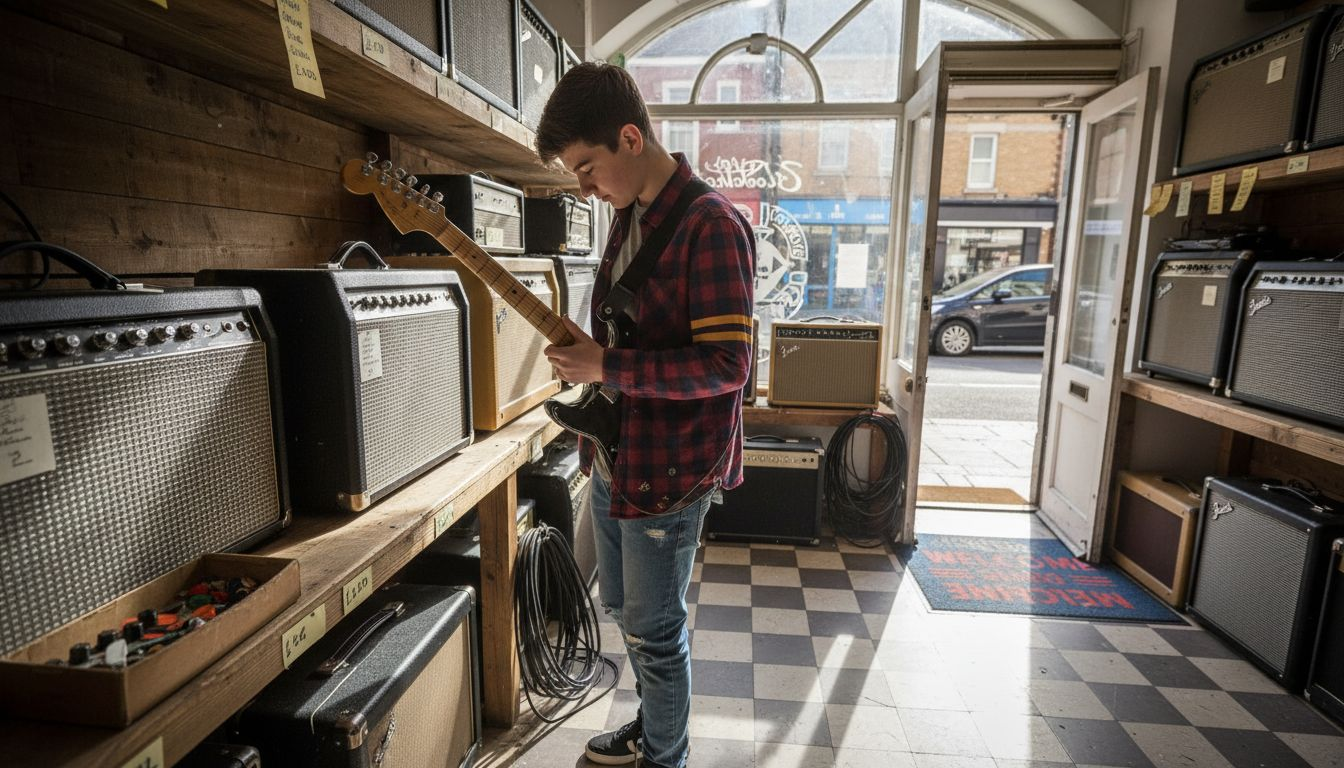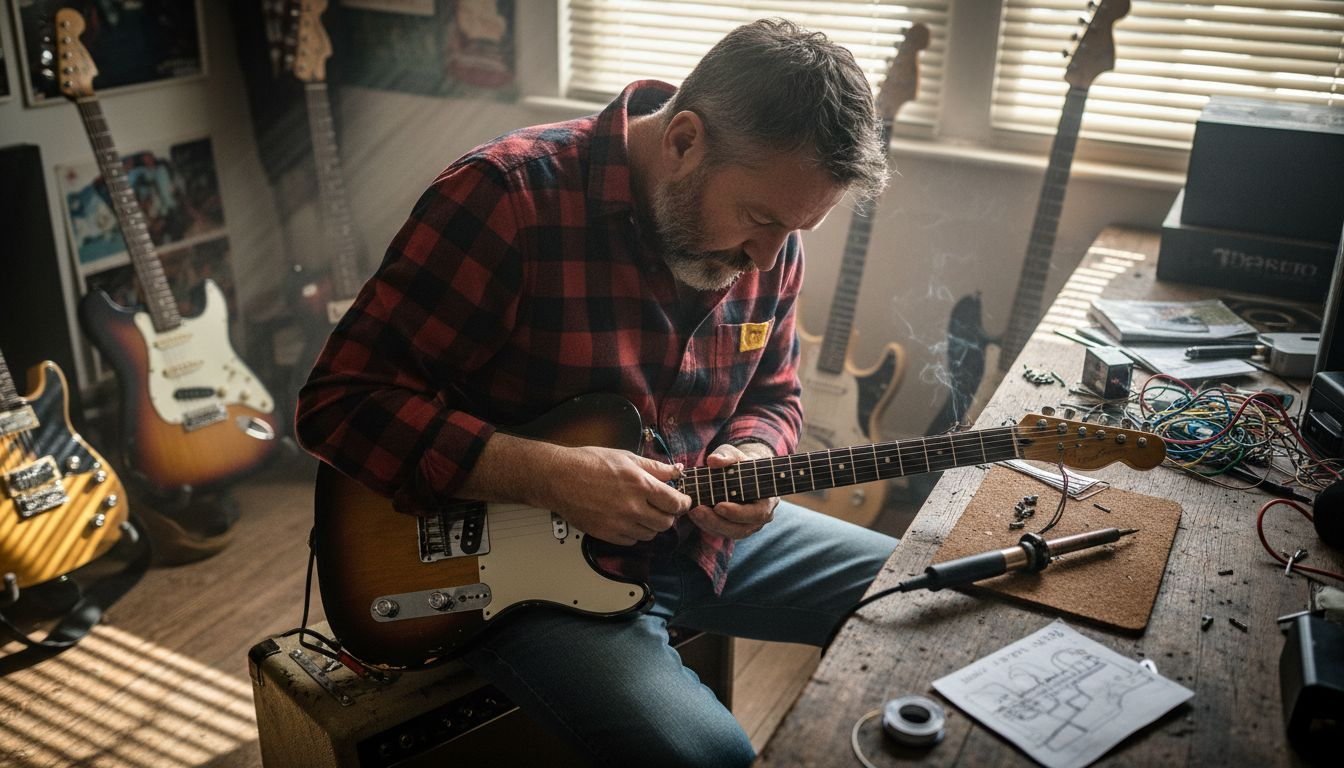Choosing the right guitar for your worship band is more than just selecting an instrument, it’s about finding the perfect tool that enhances the spiritual and musical atmosphere of worship.
In this blog, you’ll discover key considerations for selecting a guitar that suits your role in the band, whether you're leading with powerful chords or adding texture with delicate melodies. From understanding the differences between acoustic and electric guitars to learning about tonewoods, amplifiers, and effects, we cover all the essential factors to help you make the best choice. Dive in to find the guitar that resonates not only with your playing style but also with your worship community!
Choosing the Perfect Guitar for Your Worship Band: A Comprehensive Guide
Find the ideal guitar for your worship band with our guide, covering essential factors like style, budget, and personal connection etc.
1. Determine Your Role in the Band
Before diving into the specifics of guitar types, it's essential to understand your role in the worship band. Are you the lead guitarist, rhythm guitarist, or perhaps both? Each role may require different types of guitars and gear. Lead guitarists often need more versatility and dynamic range, while rhythm guitarists may prioritise consistency and warmth in their sound.
2. Acoustic vs. Electric: The Great Debate
Acoustic Guitars
Acoustic guitars are a staple in many worship bands due to their rich, natural sound and versatility. They are perfect for intimate settings and acoustic worship sets. When choosing an acoustic guitar, consider the following:
- Body Size and Shape: Smaller bodies like parlor or concert guitars are easier to handle and have a brighter sound, while larger bodies like dreadnoughts and jumbos produce more volume and bass.
- Tonewoods: Different woods affect the guitar’s tone. For example, spruce tops are known for their bright and clear sound, while mahogany offers a warmer, richer tone.
- Electronics: Many modern acoustic guitars come with built-in pickups and preamps, making it easier to plug into a sound system without losing the guitar’s natural tone.
Electric Guitars
Electric guitars offer a wide range of sounds and are essential for modern worship bands that play contemporary Christian music. When selecting an electric guitar, consider:
- Body Style: Solid body guitars like the Fender Stratocaster or Gibson Les Paul are versatile and popular. Semi-hollow and hollow body guitars, like the Gibson ES-335, offer a warmer, more resonant tone but can be prone to feedback.
- Pickups: Single-coil pickups provide a bright, clear sound, while humbuckers offer a thicker, more powerful tone. Many guitars come with a combination of both, offering greater versatility.
- Effects and Amplifiers: Electric guitars often require pedals and amplifiers to shape the sound. Consider your worship band’s style and what effects (reverb, delay, overdrive, etc.) will best complement your playing.
3. Quality and Budget
Investing in a quality guitar is crucial, but it doesn't mean you have to break the bank. Here are some tips for balancing quality and budget:
- Set a Budget: Determine how much you’re willing to spend. Good quality guitars are available at various price points.
- Research Brands and Models: Brands like Fender, Gibson, Maton, and Martin have established reputations for quality. Look for models within your budget from these and other reputable manufacturers.
- Try Before You Buy: If possible, visit a music store and try different guitars. Pay attention to how they feel and sound in your hands.
4. Practical Considerations
Playability and Comfort
Ensure the guitar is comfortable to play for extended periods. Consider the neck profile, string action, and overall weight of the guitar. A guitar that feels good in your hands will inspire confidence and better performance.
Durability
Worship bands often travel and perform in various settings, so a durable guitar that can withstand different environments is essential. Check for solid construction and reliable hardware.
Aesthetic Appeal
While sound and playability are paramount, the appearance of the guitar can also be important. Choose a guitar that visually resonates with you and fits the aesthetic of your worship band.
5. Personal Connection
Lastly, choose a guitar that you connect with on a personal level. The best instrument for you is one that inspires you to play and worship wholeheartedly. Take your time, pray for guidance, and trust your instincts.
Understanding the Role of the Guitar in Worship Music
The guitar plays a vital role in worship music, helping to create an atmosphere that enhances the congregational experience. Whether it’s leading the melody, providing rhythm, or adding dynamic textures, the guitar needs to complement the band and the overall worship style.
Different Roles of Guitar in Worship
- Lead Guitar: Focuses on melodic lines, solos, and embellishments that enhance the overall sound. It often uses effects like reverb, delay, and overdrive to add depth and emotion to the music.
- Rhythm Guitar: Provides the harmonic foundation and rhythmic drive. It usually focuses on chord progressions and strumming patterns, requiring a guitar with a full, rich sound to fill out the band's sound.
Choosing Between Acoustic and Electric Guitars for Worship
Deciding whether to use an acoustic or electric guitar in your worship band depends on the style of music, the size of the congregation, and the type of sound you want to achieve.
When to Choose an Acoustic Guitar
- Intimate Worship Settings: Acoustic guitars are ideal for smaller settings or acoustic worship sets. They provide a warm, organic sound that blends well with vocals and other acoustic instruments.
- Unplugged Sessions: An acoustic guitar is perfect for unplugged sessions where a natural, raw sound is desired. Its versatility allows it to adapt to various playing styles, from fingerpicking to strumming.
- Minimalist Approach: For worship bands that prefer a more minimalist approach, an acoustic guitar can often stand alone without needing additional effects or amplifiers.
When to Choose an Electric Guitar
- Modern Worship Styles: Electric guitars are suited for contemporary Christian music styles that incorporate rock, pop, or indie elements. They offer a broader range of sounds and effects.
- Large Congregations and Venues: Electric guitars, when paired with amplifiers and effects pedals, can produce a sound that fills larger worship spaces and cuts through the mix of a full band.
- Versatility in Soundscapes: With the ability to use different effects pedals (like delay, reverb, and chorus), electric guitars are ideal for creating ambient soundscapes that add layers of texture to worship music.
Selecting the Right Guitar Tonewoods and Construction
The type of wood used in a guitar's construction has a significant impact on its tone and overall sound. Understanding tonewoods can help you choose the right guitar for your worship band.
Common Tonewoods for Acoustic Guitars
- Spruce: A popular choice for tops due to its bright, clear sound and strong projection. Ideal for strumming and fingerpicking, making it versatile for worship music.
- Mahogany: Known for its warm, full tone with strong midrange presence. Perfect for rhythm guitarists looking to provide a solid foundation in the mix.
- Rosewood: Offers a rich, complex sound with deep lows and sparkling highs, making it great for lead parts or dynamic playing styles.
Common Tonewoods for Electric Guitars
- Alder: Provides a balanced tone with clear highs, defined mids, and a tight low end. Suitable for versatile worship settings.
- Maple: Delivers a bright, snappy tone with great sustain, perfect for cutting through a mix in larger band settings.
- Mahogany: Adds warmth and depth to the sound, often found in guitars that excel at producing a thicker, more resonant tone.
Understanding Amplification and Effects for Worship Guitar
Amplification and effects play a crucial role in shaping the sound of a guitar in a worship band. The right amp and pedal setup can enhance the worship experience by providing clarity, texture, and dynamic range.
Choosing the Right Amplifier
- Tube Amps: Known for their warm, rich sound and natural compression. They are ideal for creating dynamic sounds that respond well to different playing styles.
- Solid-State Amps: Offer reliability and a clean, crisp sound, making them suitable for worship leaders who need a consistent tone across different venues.
- Modeling Amps: Provide a wide range of built-in effects and amp simulations, allowing for flexibility in creating diverse soundscapes.
Essential Effects Pedals for Worship
- Reverb and Delay: Create ambient textures and depth, essential for modern worship music.
- Overdrive and Distortion: Add warmth and sustain to solos and lead lines without overpowering the mix.
- Chorus and Modulation Effects: Enhance clean tones by adding movement and dimension, perfect for rhythm parts and softer sections.
Considering Practical Needs and Preferences
When choosing the perfect guitar for your worship band, it’s essential to consider practical aspects like durability, comfort, and aesthetics.
Durability and Build Quality
- Reliable Hardware: Choose guitars with sturdy tuners, bridges, and nuts that can withstand frequent tuning and travel.
- Solid Construction: Guitars with high-quality wood and construction are more likely to endure the wear and tear of regular use in different environments.
Comfort and Playability
- Neck Profile and Scale Length: Select a neck profile that fits your hand comfortably, and consider a scale length that suits your playing style and finger size.
- String Gauge: Experiment with different string gauges to find a balance between ease of play and the desired tone.
Conclusion
The right guitar can make a profound difference in your worship band, helping you lead the congregation in meaningful musical praise. Whether you choose an acoustic guitar for its warm, organic sound or an electric guitar for its versatility and dynamic range, the key is finding an instrument that feels like an extension of your spirit and enhances the worship experience. Take your time, consider your needs, and choose a guitar that inspires you to play with confidence, passion, and heart. May your new guitar be a blessing in your musical journey and a powerful tool for worship.
At MusicStreet, we're committed to helping you find the perfect guitar for your worship band. With our wide range of high-quality instruments and expert advice, you’ll find the right guitar to inspire your music and elevate your worship. Visit us today and let us help you make a joyful noise!
Happy playing, and may your new guitar bring joy and inspiration to your worship journey!
Frequently Asked Quetions
How do I choose between an acoustic or electric guitar for worship?
Consider the style of worship music your band plays. An acoustic guitar is great for creating a warm, intimate atmosphere, while an electric guitar offers more versatility with effects and dynamic range, making it ideal for modern, upbeat worship styles.
What should I do if my guitar doesn’t blend well with the band’s sound?
If your guitar feels out of place in the mix, try adjusting your tone and volume settings. Use effects like reverb or delay to add depth, or change your playing style to better complement the other instruments. Experiment with different pickup settings if you're using an electric guitar.
How do I maintain my guitar to ensure it performs well during worship?
Regularly clean your guitar, especially the strings and fretboard, to prevent dirt buildup. Keep it stored in a case to protect it from temperature changes, and check the tuning and intonation before each performance to ensure it sounds its best.
What can I do if my guitar sounds too harsh or bright in the church’s acoustics?
Try using different tone settings on your guitar or amp to soften the sound. Adjusting your playing technique, like using lighter picks or playing closer to the neck, can also help create a warmer tone. Consider using effects pedals to shape your sound to suit the environment.
How do I prevent feedback when playing an electric guitar in a worship band?
To prevent feedback, position yourself away from your amplifier and other speakers. Lower your gain or volume settings and avoid standing directly in front of your amp. You can also use noise suppression pedals to reduce unwanted noise and feedback.
What should I look for in a guitar amplifier for worship settings?
Look for an amplifier that offers clean tones, with built-in effects like reverb or delay to create ambient soundscapes. Consider a lightweight, portable amp with sufficient wattage to fill the worship space without overpowering the rest of the band.
How do I know if my guitar’s tonewoods are suitable for worship music?
Tonewoods like spruce, mahogany, and rosewood are popular choices for worship guitars because they provide a balanced sound suitable for various playing styles. Spruce offers brightness, mahogany gives warmth, and rosewood adds richness. Choose a tonewood that complements your playing style and the overall sound of your worship band.



Share:
Mastering the art of guitar shopping
Beyond the minor pentationics